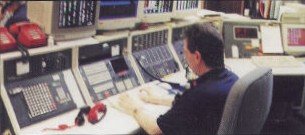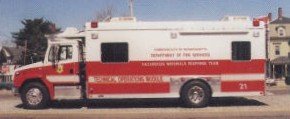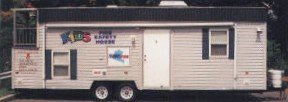"...working together to achieve great protection"
METROFIRE is an association of 34 metropolitan Boston fire departments that provides coordination of mutual aid response to improve the effectiveness of fire services. These fire departments, with the support and approval of their local governments, were formed in 1976, expanded in 1980, and incorporated in 2003. Metrofire is authorized under provisions of the Massachusetts General Laws. Its service area encompasses the area within the Route 128 perimeter, serving an area of 351 square miles and 30% of the state's residents.
Metrofire's mission critical activities include:
1. Coordination of multi-community fire and EMS response
2. Provision of an interoperable and integrated radio communications network
3. Planning and training for fire and medical response
4. Responding to major incidents with specialized equipment and staff
5. Homeland Security coordination
6. Disaster response
In today's environment of high-rise structures, sprawling industrial and shopping complexes, and expanding exposure to hazardous materials, no individual community can afford to completely equip and staff a department to provide total self-protection. Metrofire utilizes the cooperative efforts of its member communities to eliminate the dupliaction of highly specialized emergency equipment and staffing.
COMMON RESOURCES
The role of Metrofire is to recognize and mitigate the fact that no single community has the resources to sufficiently protect itself from the disastrous effects of fires, explosions, multi-casualty incidents, and other large scale emergencies. This is the historic basis for the establishment of mutual aid response of equipment and personnel between the communities. A natural extension of this concept is the mutual sharing of highly specialized resources.
In the fire service, there are many incidents requiring specialized equipment that are vital to a given situation, but not typically used in day-to-day operations. Metrofire provides the mechanism for cooperative sharing of these types of resources. Metrofire, through coordination with its member departments, delivers resources to communities immediately upon request.
METROFIRE ACTIVITIES
The Control Center
 The Metrofire Control Center is incorporated into the operation of the Boston Fire Department. Fire Alarm Operators monitor the activity of Metrofire's departments and coordinate response within the region.
The Metrofire Control Center is incorporated into the operation of the Boston Fire Department. Fire Alarm Operators monitor the activity of Metrofire's departments and coordinate response within the region.
Mutual Aid
The primary mission of METROFIRE is to provide proper coordination, communication, and response of the region's mutual aid firefighting and emergency medical forces.
Common Purchase
Metrofire maintains a common purchase system that provides substantial savings with group buying power. Metrofire also utilizes the statewide procurement system to provide the best value for its member communities.
Communications
Metrofire operates a multi-channel radio system for dispatch and coordination of firefighting apparatus and emergency medial units. A mobile Command and Communications vehicle is also operated for complex operations.
Hazardous Material
Metrofire developed, trained, and operated the first regional Hazardous Materials Response Team in Massachusetts. In 1990, the Commonwealth organized five additional regional response teams. Metrofire continues to serve the region with state funding and Department of Fire Services supoprt.
10 ALARM RUNNING CARD SYSTEM
 The 10-Alarm Metrofire Running Card system has been designed to supplement traditional, local mutual aid systems. Response is preplanned to meet the needs of the area fire departments. The system coordinates a complex matrix of responding resources and manpower. The system preplans the response to major incidents and the substitution of apparatus required to respond into any community that, due to its own level of activity, are unable to respond to additional emergencies. The system has historically proven its flexibility and effectiveness. Fire apparatus and ambulance response between communities occur on a daily basis. Both large-scale and simultaneous fires are routinely handled by the Metrofire system. Fire Alarm Operators provide for the rapid dispatch of supplemental aid to communities, provide for the substitution of apparatus when overburdened departments are unable to respond, and ensure that specialized resources are delivered immediately when requested.
The 10-Alarm Metrofire Running Card system has been designed to supplement traditional, local mutual aid systems. Response is preplanned to meet the needs of the area fire departments. The system coordinates a complex matrix of responding resources and manpower. The system preplans the response to major incidents and the substitution of apparatus required to respond into any community that, due to its own level of activity, are unable to respond to additional emergencies. The system has historically proven its flexibility and effectiveness. Fire apparatus and ambulance response between communities occur on a daily basis. Both large-scale and simultaneous fires are routinely handled by the Metrofire system. Fire Alarm Operators provide for the rapid dispatch of supplemental aid to communities, provide for the substitution of apparatus when overburdened departments are unable to respond, and ensure that specialized resources are delivered immediately when requested.
HazMat Response Team
 The METROFIRE District HazMat Response Team, comprised of 40 specially trained members from community departments is part of the Statewide Hazardous Material Response System and is available to mitigate hazardous materials incidents. The Metrofire Hazmat Team operates an Operational Response Unit and a Technical Operations Module.
The METROFIRE District HazMat Response Team, comprised of 40 specially trained members from community departments is part of the Statewide Hazardous Material Response System and is available to mitigate hazardous materials incidents. The Metrofire Hazmat Team operates an Operational Response Unit and a Technical Operations Module.
Air Supply Unit
Metrofire operates a van mounted air supply unit. The unit is capable of filling both 2200 psi and 4500 psi air bottles. It is dispatched upon request.
MBTA Evacuation/Rehabilitation Buses
 The MBTA provdes buses for emergency evactuations from incident areas, and two specially modified buses for firefighter rehabilitation on the fireground. The Rehabilitation Units, known as "Community Response Units", are fitted with bench seats to accommodate firefighters in full turnout gear. They have heat and air-conditioning to provide personnel with relief in any season.
The MBTA provdes buses for emergency evactuations from incident areas, and two specially modified buses for firefighter rehabilitation on the fireground. The Rehabilitation Units, known as "Community Response Units", are fitted with bench seats to accommodate firefighters in full turnout gear. They have heat and air-conditioning to provide personnel with relief in any season.
Fire Safety House Trailer
 The Metrofire Fire Safety House is a trailer available for use by Metrofire communities for fire prevention and training purposes.
The Metrofire Fire Safety House is a trailer available for use by Metrofire communities for fire prevention and training purposes.
Critical Incident Stress Debriefing Team
METROFIRE recognizes that certain incidents may have profound physical and psychological effects on fire and rescue personnel. To reduce the impact of such stress, METROFIRE has established a partnership with the Boston Fire Department Critical Incident Stress Debriefing Team (CISD). Specially trained CISD personnel are available to provide on-scene or post-incident support for fire and rescue personnel.